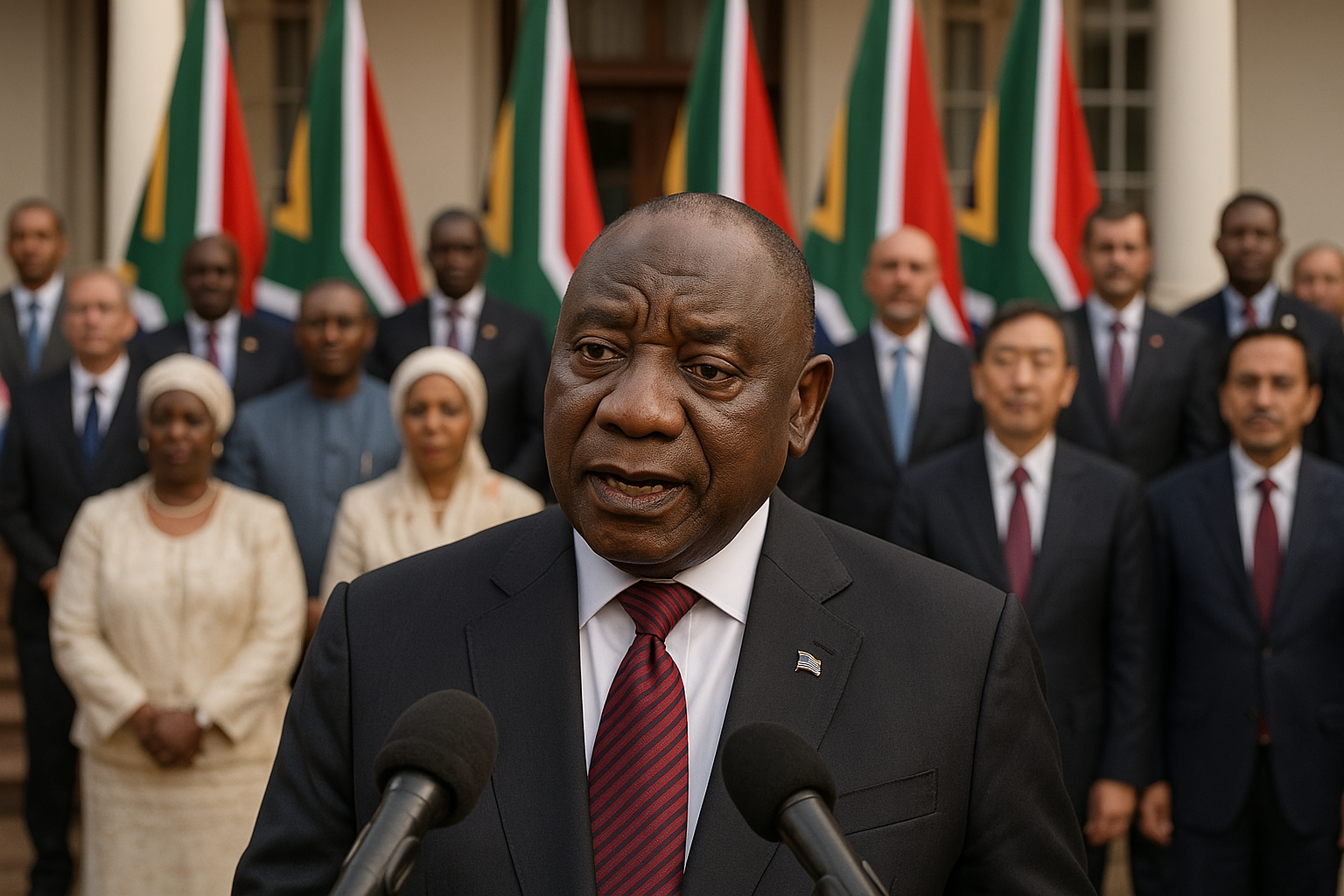President Ramaphosa Urges South Africans to Honour Struggle Icons, Rebuild Unity
The President’s message came shortly after the ceremonial reburial of anti-apartheid stalwart Advocate Duma Nokwe, a respected legal mind and political activist who passed away in exile.

- Country:
- South Africa
President Cyril Ramaphosa has called on South Africans to honour the memory of the nation’s struggle icons, particularly those who paid the ultimate price in the fight against apartheid. In his latest weekly newsletter, the President emphasized the importance of remembering those who laid the foundation for the country's democracy, noting that South Africa’s freedom came at a steep and painful cost.
The President’s message came shortly after the ceremonial reburial of anti-apartheid stalwart Advocate Duma Nokwe, a respected legal mind and political activist who passed away in exile. Recognizing Nokwe’s lifelong contribution to justice and equality, President Ramaphosa posthumously awarded him the honorary title of Senior Counsel (Silk). This symbolic act served not only as a tribute to Nokwe’s legacy but also as part of broader efforts to acknowledge unsung heroes who were denied dignity in life.
The Price of Liberation
In his letter, President Ramaphosa lamented the profound personal losses endured by countless South African families during apartheid. Many families, he noted, were never given the opportunity to bury their loved ones or even to know the circumstances of their deaths.
“A heavy price was paid by many for the democracy we have today. This should continue to inspire us as we work together towards a shared future,” he wrote. The President emphasized that remembering these sacrifices is not only a moral obligation but also a cornerstone of national healing and reconciliation.
He added that South Africa’s journey toward unity and justice is ongoing. “In the interests of national reconciliation, and in the interests of moving forward, we will continue our efforts to restore dignity to all those who were denied it in life,” he said.
The Truth and Reconciliation Commission and Its Legacy
The Truth and Reconciliation Commission (TRC), established in the early years of South Africa’s democracy, was an important attempt to expose the atrocities committed during the apartheid regime. Although the TRC provided a platform for many victims to be heard, President Ramaphosa acknowledged its limitations.
“Even as democratic South Africa attempted to unearth what happened and to hold those responsible to account, many apartheid-era security officials either refused to appear before the TRC or did not fully disclose their actions,” he said. Some individuals reportedly used legal loopholes or resorted to delaying tactics to avoid accountability.
In light of these challenges, the President confirmed that a judicial commission of inquiry will be established to investigate alleged interference in the investigation and prosecution of apartheid-era crimes that were referred by the TRC. This move signals renewed commitment to justice, truth, and institutional integrity.
Repatriating the Nation’s Heroes
During apartheid, many liberation fighters fled South Africa to escape persecution, with some dying in exile and being buried abroad. Advocate Duma Nokwe was among them, and his recent reburial symbolizes ongoing efforts to bring home those who died far from their homeland.
President Ramaphosa assured families who are still waiting for the return of their relatives’ remains that government efforts are progressing. “We are steadfast in our commitment to restoring the dignity of activists who died and were buried abroad, and to our countrymen and women who were subjected to indignities in foreign lands,” he said.
These efforts are being carried out in line with the National Heritage Resources Act, which was instrumental in the return and reburial of Sara Baartman in 2002. The President also highlighted the development of a draft National Policy on the Repatriation and Restitution of Human Remains and Heritage Objects, which aims to provide a comprehensive legal and procedural framework.
Ongoing negotiations between the Department of Sport, Arts and Culture and foreign governments are helping to facilitate the return of these remains, allowing for proper ceremonial farewells and national recognition.
Healing Through Remembrance
President Ramaphosa concluded his message by reflecting on the importance of confronting the past with honesty and empathy. “Dealing with the memory of past atrocities is one of the most difficult and delicate tasks a nation can undertake,” he said. Yet, he argued, it can also be profoundly cathartic and serve as a foundation for a stronger, more cohesive society.
“The way a country remembers its painful past can shape the character of its democracy, the legitimacy of its institutions, and the resilience of its people,” he wrote. South Africa’s democratic journey, he added, has always included policies of redress and restitution to correct the injustices of apartheid and offer some closure to victims and their descendants.
In his closing remarks, President Ramaphosa reaffirmed that restoring the dignity of apartheid’s victims remains a national priority. “We remain equally committed to restoring the dignity of apartheid’s countless victims and to bringing closure to their families,” he said.
The President’s heartfelt appeal serves as a reminder that honoring the past is not merely an act of remembrance, but a necessary step toward building a more united, just, and dignified future for all South Africans.
ALSO READ
Ramaphosa Seeks Economic Opportunities for South Africa in Washington Discussions
Australia and South Africa Set for High-Stakes WTC Final Showdown
Farmers Challenge U.S. Perception: Debunking 'Genocide' Myths in South Africa
Tensions Rise as Trump Hosts South Africa's Ramaphosa
Trump's Focus on South Africa's G20 Summit Presidency










